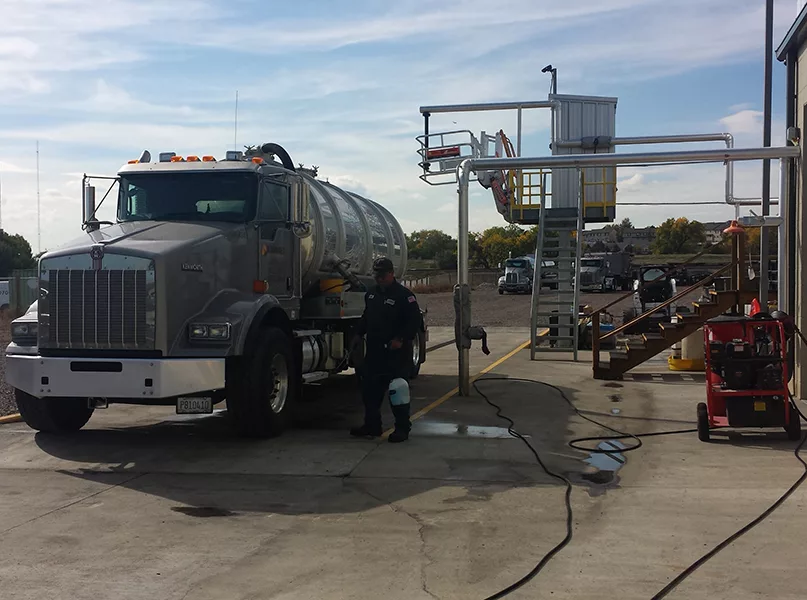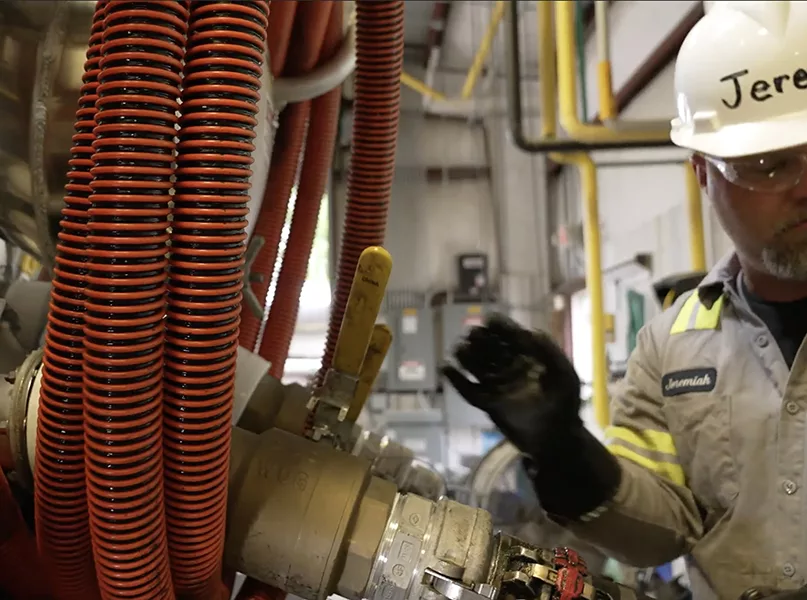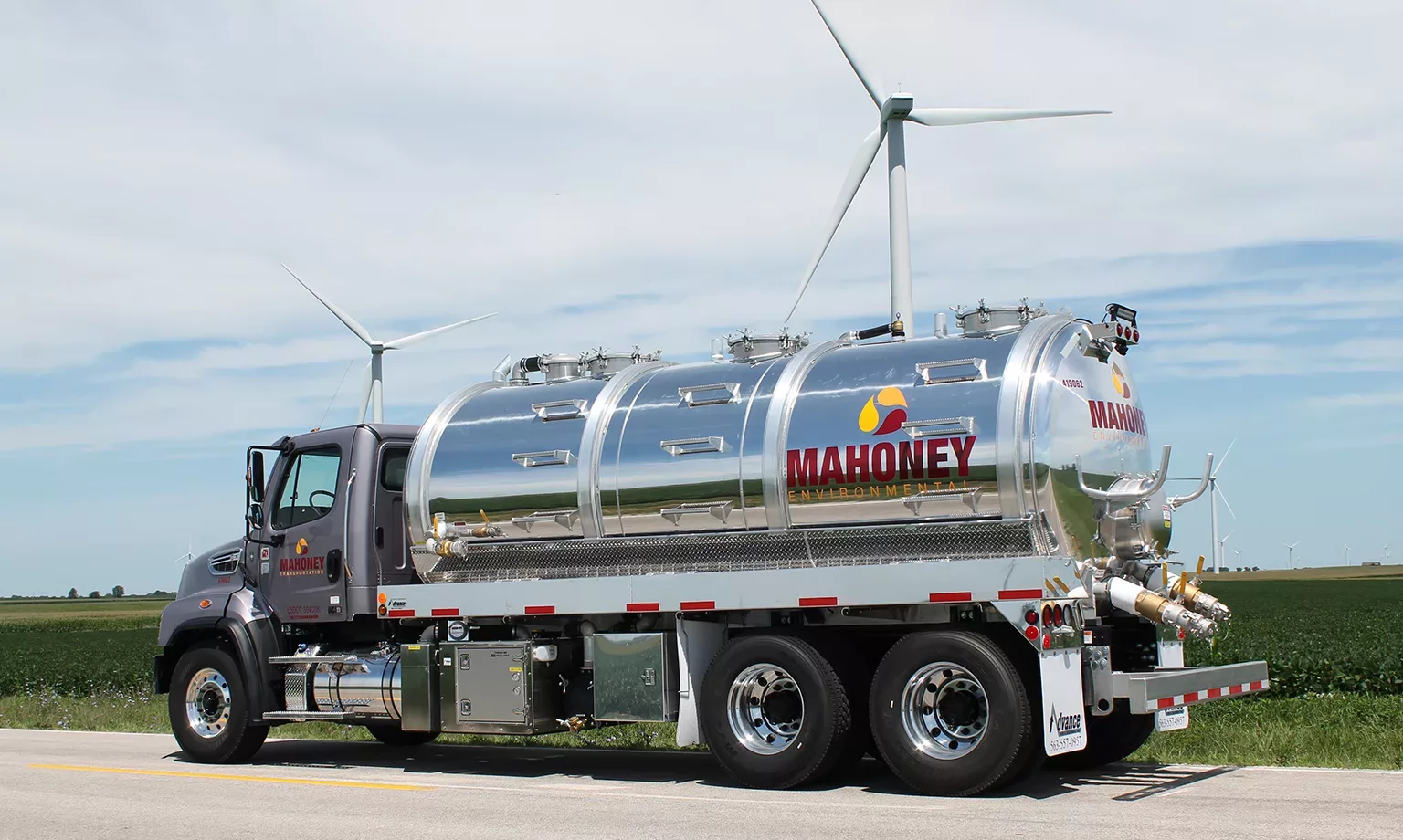By collecting and recycling used cooking oil, Mahoney Environmental is addressing the issue of improper waste disposal. President and CEO, Dave Kimball, highlights this sustainable practice in the foodservice industry.
DISPOSING DONE PROPERLY
Cooking oil waste has become a significant environmental issue in recent years, as it can have detrimental effects on the planet such as water and air pollution.
For example, used cooking oil that is poured down the drain can travel through the sewage system and make its way into rivers and oceans, polluting the water supply and causing aquatic life to perish. Equally, when cooking oil waste is sent to landfill, it can release methane, a potent greenhouse gas (GHG) that contributes to climate change.
Failure to recycle used cooking oil can therefore cause significant environmental damage, and the food supply chain would be adversely affected if the sustainability of plant and animal life was impacted.
Fortunately, there is increasing awareness of the environmentally friendly and sustainable practice of recycling used cooking oil, which can be converted into a renewable fuel source and used in place of fossil fuels, helping to mitigate climate change and reduce GHG emissions.
“The used cooking oil collection and recycling industry is getting more and more competitive,” notes Dave Kimball, President and CEO of Mahoney Environmental (Mahoney).
“Companies are realizing the potential of how used cooking oil can be recycled into beneficial products, so the demand for it is growing.”
Likewise, as world energy sources decline, demand is skyrocketing for renewables such as sustainable aviation fuel and renewable diesel, two of a growing list of useful products derived from used cooking oil.
As the topic of climate change has become an increasingly mainstream issue in the public domain, added importance has been placed on the work that Mahoney does.
“People might not know or see the connection between used cooking oil recycling and the environment, but we’re able to make the environment safer for future generations by turning a waste product into renewable fuels,” states Kimball, whose time at Mahoney has opened his eyes to the incredible things that can be done through sustainable initiatives.

CLEANING UP FOODSERVICE
Mahoney is the number one choice for all cooking oil management needs in the US, with the goal of being the premier back-of-the-house service provider to a variety of foodservice operators across the country.
“We are a nationwide provider, servicing over 60,000 foodservice operators across the US. Our customers range from well-managed independent restaurants to national chains, airports, casinos, and stadiums,” Kimball outlines.
Around three billion gallons of used cooking oil per year is generated by restaurants, hotels, stadiums, and other venues across the US, enough to fill more than 4,500 Olympic swimming pools.
In fact, eight percent of GHG emissions are emitted by restaurant food waste, such as used cooking oil, of which large amounts are generated by the foodservice industry.
A lot of this used cooking oil currently goes to waste; however, the company’s national footprint plays an important role in attracting business from such venues to help solve their disposal problems.
Indeed, complementing Mahoney’s headquarters in Joliet, Illinois is an expansive network of processing facilities across the country, which can recycle close to 100 percent of the materials processed.
“At our Mendota facility, for example, we use basically every ounce of material we pick up, from the water being used as fertilizer in the adjacent corn fields to the methane from the anaerobic digester fueling our facility,” shares Kimball.
With this coast-to-coast service network, the company can collect, handle, transport, and process used cooking oil, maximizing value through its transparent service programs and recycling process.
The company is building an additional two plants in Orlando and Kansas City, respectively, which will be state of the art and allow Mahoney to improve its operational efficiency.
“Several new expansion projects are on the horizon, as well as more sustainability projects. We are focused on growing the business, so we can continue to spread the word on sustainability.
“These projects allow us to do our part in making the world a better place for our children. We feel that it is our responsibility to help take care of the planet,” Kimball adds.
SEVEN DECADES OF RECYCLING
Since 1953, Mahoney has helped foodservice companies recycle used cooking oil and other waste forms and turn them into useful products, such as renewable diesel and sustainable aviation fuel.
Licensed by the Environmental Protection Agency (EPA), the company has thus been at the forefront of collecting and recycling used cooking oil for 70 years. This extensive experience is particularly timely, as today, government regulations surrounding the disposal of restaurant waste have never been more stringent.
Mahoney manages the entire recycling process from equipment set-up to collection and processing, right up to the finished product. The added value that the company captures from used cooking oils is then passed on to restaurants and other foodservice operators, positively impacting their bottom lines.
Mahoney’s cooking oil services don’t stop there, however, as the company also offers foodservice entities indoor and outdoor grease trap maintenance, automated equipment for collecting used cooking oil, and in select markets, fresh oil.
This unique, integrated business model enables the company to provide an unparalleled customer value proposition.
All aspects of Mahoney’s differentiated service model are supported by Neste, the world’s leading producer of sustainable aviation fuel and renewable diesel produced from waste and residue raw materials, who fully acquired the company in 2020.
By acquiring Mahoney, Neste has gained substantial access to used cooking oil, and is now working with a growing business that knows how to safely collect and pretreat it.
For Mahoney, it means joining a larger company that’s focused on creating a positive environmental impact and presents an exciting opportunity to find more ways to help the environment by turning more used cooking oil into sustainable fuels.
“I quickly learned that recycling waste cooking oil was very important in reducing emissions and that through Neste’s technology, it could become renewable diesel, sustainable aviation fuel, or even polymers,” says Kimball.
“As different companies realize the potential of how used cooking oil can be recycled into beneficial products, the demand for it is growing”
Dave Kimball, President and CEO, Mahoney Environmental
AUTOMATED EQUIPMENT
Mahoney provides the most durable, easiest-to-use, and most reliable oil waste management and recycling equipment in the foodservice industry to help with the disposal of cooking oil.
It starts with a careful assessment of the client’s kitchen operations, to design a system of cooking oil equipment that best suits their needs.
The company’s equipment can even be retrofitted into kitchens to help streamline used cooking oil usage and disposal.
A plethora of cooking oil equipment is offered by Mahoney, including automated systems, which are the safest, easiest, and cleanest way to manage used cooking oil.
These automated systems automate the handling of used cooking oils, so employees do not have to handle the oil manually and are a key differentiating factor between the company and its competitors.
Mahoney offers three types of automated systems, including direct connection recycling, which connects directly to the fryers.
Hot, used cooking oil is pumped from the fryer directly into their equipment, which is positioned either inside the restaurant or outside in its own storage compartment. A portable filter machine can also be used if the fryers do not have built-in filtration capabilities.
Restaurants across the nation are legally required to recycle their cooking oil, and automated oil management systems are one of the safest ways to do so, as it eliminates the need to transfer hot oil waste to and from storage areas and then to the fryers.
“Direct connection recycling allows employees to flip a switch and dump their used cooking oil, which makes it safer for staff and eliminates slips, trips, and spills,” explains Kimball.
“Safety is one of our core values, and we feel that with our innovative automated equipment, we are able to provide a clean and hassle-free process for foodservice employees to dispose of their used cooking oil.”
Automated indoor systems are also designed and installed by Mahoney in restaurants that have enough interior floor space.
With this system, the holding tanks are installed indoors with pipelines that run directly into the fryers.
Heated outdoor bulk containers, meanwhile, are outdoor installations that are insulated and heated to handle used cooking oil and leftover solids.
The used cooking oil is then taken to the container from the fryers using an oil shuttle or caddy. These containers filter debris from the cooking oil, whilst select indoor and outdoor containers can be installed with a remote reporting level sensor to monitor the oil levels.

CUSTOMIZED SYSTEMS
In addition to automated equipment, Mahoney can help to design custom cooking oil systems based on the kitchen layout, the operation of the kitchen, and the volume of frying, with all used cooking oil handled in a clean and safe manner.
The company is therefore able to provide the piece of equipment that is most appropriate to each kitchen for different types of customers.
“Depending on the size of the location, tank placement, and additional features to consider, we can accommodate them to create equipment that meets our customers’ needs,” says Kimball.
Almost all the cooking oil collected and recycled by Mahoney via its equipment is distributed as feedstock for sustainable aviation fuel and renewable diesel production, the former of which reduces GHG emissions by 86 percent compared to petroleum diesel.
Mahoney provides transparent reporting on the amount of used cooking oil it collects from each customer, and how much of it is transformed into renewable fuels.
“We provide this data in our Fryer Oil History Reports. This way, customers have full insight into their used cooking oil collection and recycling information,” Kimball
tells us.
Focused on reaching more restaurants and providing the best customer service in the industry, the coming year is set to bring many opportunities and challenges for the company and its 500 employees across the US.
“Our employees are the backbone of our company, and together, we are focused on creating a healthier and safer planet for future generations,” concludes Kimball.
“They work hard every day, knowing they are making a positive impact on our environment, helping our restaurant partners be focused on their customers, and contributing to reducing their carbon footprint.”
MAHONEY ENVIRONMENTAL PARTNER

































